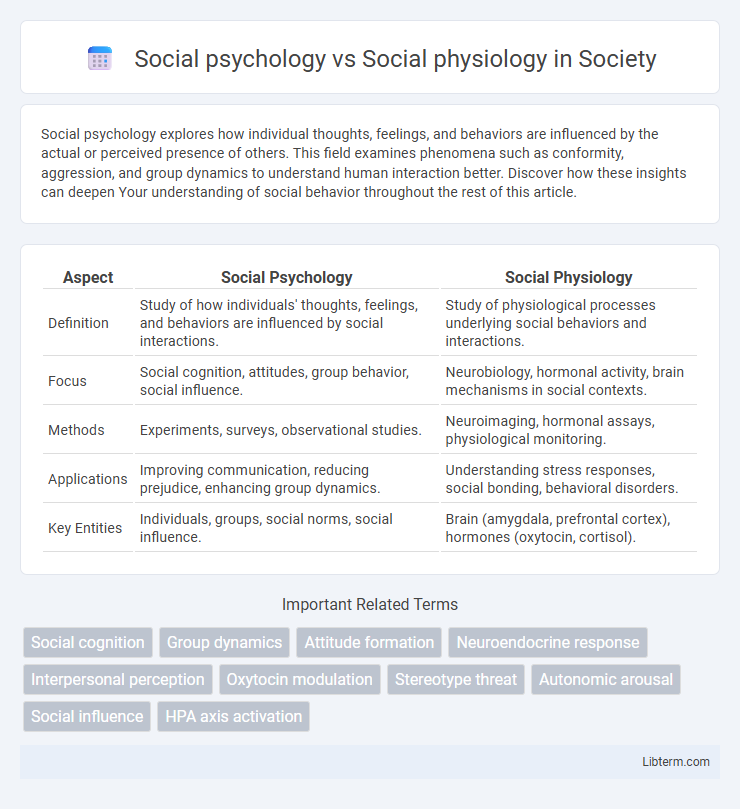Social psychology explores how individual thoughts, feelings, and behaviors are influenced by the actual or perceived presence of others. This field examines phenomena such as conformity, aggression, and group dynamics to understand human interaction better. Discover how these insights can deepen Your understanding of social behavior throughout the rest of this article.
Table of Comparison
| Aspect | Social Psychology | Social Physiology |
|---|---|---|
| Definition | Study of how individuals' thoughts, feelings, and behaviors are influenced by social interactions. | Study of physiological processes underlying social behaviors and interactions. |
| Focus | Social cognition, attitudes, group behavior, social influence. | Neurobiology, hormonal activity, brain mechanisms in social contexts. |
| Methods | Experiments, surveys, observational studies. | Neuroimaging, hormonal assays, physiological monitoring. |
| Applications | Improving communication, reducing prejudice, enhancing group dynamics. | Understanding stress responses, social bonding, behavioral disorders. |
| Key Entities | Individuals, groups, social norms, social influence. | Brain (amygdala, prefrontal cortex), hormones (oxytocin, cortisol). |
Introduction to Social Psychology and Social Physiology
Social psychology examines how individuals' thoughts, feelings, and behaviors are influenced by the actual, imagined, or implied presence of others, focusing on social interactions, group dynamics, and attitude formation. Social physiology studies the biological underpinnings of social behavior, analyzing how physiological processes such as hormonal activity and neural mechanisms regulate social interactions and emotional responses. Understanding social psychology provides insight into cognitive and behavioral patterns in social contexts, while social physiology explores the physical systems underlying these behaviors.
Defining Social Psychology: Scope and Focus
Social psychology explores how individuals' thoughts, feelings, and behaviors are influenced by social interactions, group dynamics, and societal expectations. It covers topics such as social perception, group behavior, social influence, and interpersonal relationships, emphasizing psychological processes within social contexts. Social physiology, by contrast, investigates the biological and neurological mechanisms underlying social behavior, focusing on physiological responses and brain functions related to social interaction.
Understanding Social Physiology: Fundamental Concepts
Social physiology explores the biological basis of social behavior by examining how physiological processes like hormone activity, neural responses, and genetic factors influence interactions within groups. Fundamental concepts include the study of stress responses, social bonding mechanisms such as oxytocin release, and brain areas responsible for empathy and social cognition. Understanding these elements reveals how bodily functions underlie collective behaviors and social dynamics.
Historical Development of Both Disciplines
Social psychology emerged in the late 19th century, with pioneers like Norman Triplett and Kurt Lewin exploring how social environments influence individual behavior, emphasizing cognitive processes and group dynamics. Social physiology, less commonly referenced, developed through the integration of biology and sociology, examining physiological responses in social contexts, with foundational work from figures such as Walter Cannon and Hans Selye on stress and the body's adaptation mechanisms. The historical development of social psychology focused on mental and behavioral aspects within societal frameworks, while social physiology concentrated on the biological underpinnings of social interaction and adaptation.
Research Methods in Social Psychology vs Social Physiology
Social psychology primarily employs experimental methods, surveys, and observational studies to analyze human behavior, attitudes, and social interactions within groups. Social physiology focuses on physiological measurements such as brain imaging, hormone assays, and autonomic nervous system monitoring to understand the biological basis of social behavior. Research methods in social psychology emphasize cognitive and behavioral assessments, whereas social physiology relies on biological data collection and analysis techniques.
Core Theories and Models Compared
Social psychology centers on theories like the Social Identity Theory, which explores group membership's impact on self-concept, and the Theory of Planned Behavior, emphasizing attitudes and intentions shaping social actions. In contrast, social physiology investigates biological underpinnings of social behavior using models such as the Polyvagal Theory, which explains autonomic nervous system responses in social contexts, and hormonal frameworks analyzing oxytocin's role in bonding. While social psychology primarily addresses cognitive and behavioral processes within social interactions, social physiology links these interactions to physiological mechanisms and neural substrates.
Key Differences in Subject Matter and Approach
Social psychology investigates how individual thoughts, feelings, and behaviors are influenced by social interactions, emphasizing cognitive processes and social influences. Social physiology studies the physiological responses and biological mechanisms underlying social behavior, focusing on neural, hormonal, and genetic factors. The key difference lies in social psychology's focus on mental and social factors versus social physiology's emphasis on biological and physiological processes in social contexts.
Overlapping Areas and Interdisciplinary Insights
Social psychology and social physiology intersect in exploring how social environments influence both mental processes and physiological responses, such as stress-related hormone fluctuations triggered by social interactions. Research on psychoneuroimmunology exemplifies this overlap, revealing how social support modulates immune function through neuroendocrine pathways. Interdisciplinary insights integrating behavioral science and biological mechanisms advance understanding of how social behavior affects health outcomes and inform interventions targeting both psychological well-being and physical health.
Real-world Applications in Society and Health
Social psychology examines how individual behavior and mental processes are influenced by social interactions, impacting areas such as group dynamics, prejudice reduction, and mental health interventions. Social physiology explores the biological mechanisms underlying social behavior, including hormonal responses and neural activity linked to stress, cooperation, and social bonding. Integrating insights from both fields enhances real-world applications, improving public health strategies, social support systems, and interventions for social disorders.
Future Directions and Emerging Trends
Future directions in social psychology emphasize integrating advanced neuroimaging techniques to better understand the neural mechanisms underlying social behaviors and interpersonal interactions. Emerging trends include the use of big data analytics and artificial intelligence to model social dynamics and predict group behaviors with higher precision. Social physiology research is expanding towards studying psychophysiological responses in real-time social environments, fostering interdisciplinary approaches combining biology, psychology, and sociology for a holistic understanding of social functioning.
Social psychology Infographic

 libterm.com
libterm.com